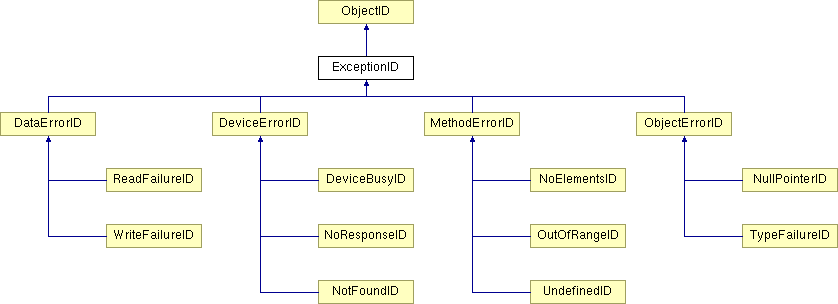
|
The Simons
|

|
The Simons
|
#include <ExceptionID.h>
Inheritance diagram for ExceptionID:

ExceptionID is a strongly typed, reference counting pointer that refers to an Exception. ExceptionID variables may be initialised to Exception* objects and all subtypes. ExceptionID variables may alias objects held by other ExceptionID variables, or any subtype. When an ExceptionID acquires an object, it increments the object's reference count. When an ExceptionID releases an object, it decrements the object's reference count. If the reference count reaches zero, the object is automatically deleted.
Public Member Functions | |
| ExceptionID () | |
| Declare an ExceptionID. | |
| ~ExceptionID () | |
| Release an ExceptionID. | |
| ExceptionID (const Null *) | |
| Initialise an ExceptionID to refer explicitly to null. | |
| ExceptionID (const Exception *) | |
| Initialise an ExceptionID to refer to an Exception. | |
| ExceptionID (const ExceptionID &) | |
| Initialise an ExceptionID to alias another ExceptionID. | |
| ExceptionID & | operator= (const Exception *) |
| Reassign this ExceptionID to refer to an Exception. | |
| ExceptionID & | operator= (const ExceptionID &) |
| Reassign this ExceptionID to alias another ExceptionID. | |
| Exception * | operator-> () const |
| Invoke a method on this ExceptionID. | |
|
|
Declare an ExceptionID.
|
|
|
Release an ExceptionID.
|
|
|
Initialise an ExceptionID to refer explicitly to null.
|
|
|
Initialise an ExceptionID to refer to an Exception.
|
|
|
Initialise an ExceptionID to alias another ExceptionID.
|
|
|
Invoke a method on this ExceptionID.
Reimplemented from ObjectID. Reimplemented in DataErrorID, DeviceBusyID, DeviceErrorID, MethodErrorID, NoElementsID, NoResponseID, NotFoundID, NullPointerID, ObjectErrorID, OutOfRangeID, ReadFailureID, TypeFailureID, UndefinedID, and WriteFailureID. |
|
|
Reassign this ExceptionID to alias another ExceptionID.
|
|
|
Reassign this ExceptionID to refer to an Exception.
|
 1.3
1.3